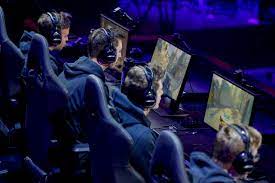In recent years, Esports has taken the world by storm. With millions of viewers and players worldwide, Esports has become a global phenomenon that has captured the attention of people from all walks of life. While many views In this article, Esports as just a form of entertainment, it has significant cultural significance in different countries and regions around the world.
Esports in different countries and regions
Esports is the competitive playing of video games, often in a professional or semi-professional capacity. It has gained immense popularity over the years, with competitive gaming tournaments attracting millions of viewers and offering huge cash prizes. Esports is no longer just a niche hobby, but a mainstream form of entertainment that has a growing impact on cultures worldwide.

South Korea is widely regarded as the birthplace of Esports. It is a country that has a strong culture of video gaming, and Esports has become a major part of its national identity. The Korean government has invested heavily in the industry, building Esports stadiums and training centres to help nurture talent. South Korean Esports teams have achieved great success on the international stage, with players becoming household names in the country.
Esports is more than just a hobby or pastime in South Korea. It is a source of national pride and a reflection of the country’s technological advancement. South Korea’s successful Esports industry has led to the development of related industries, such as gaming cafes, where people can gather to play games and watch Esports tournaments together.
In China, Esports is also highly popular and has become a significant part of their culture. China has the largest gaming population in the world, and Esports has become a massive industry in the country. The Chinese government has also recognised the cultural significance of Esports and has made efforts to promote it as a legitimate career path.
Esports tournaments in China attract millions of viewers, and the country has produced some of the best Esports players in the world. The rise of Esports in China has led to the development of gaming communities, with gaming cafes and Esports clubs becoming popular gathering places for gamers.
In Europe, Esports have become increasingly popular in recent years. The Esports industry has grown significantly in the UK, with major tournaments taking place regularly. The country has produced some of the best Esports players in the world, and many UK universities now offer Esports degrees and scholarships.
Esports has also become a significant part of the culture in Scandinavia. Sweden, Denmark and Norway are home to some of the best Esports players in the world, with their national teams achieving great success on the international stage. The Scandinavian countries have a strong culture of gaming, and Esports has become a major part of their gaming communities.
In the United States, Esports is a rapidly growing industry. While it may not be as culturally significant as it is in other parts of the world, Esports is gaining traction as a mainstream form of entertainment. Major tournaments such as the League of Legends World Championship and the Overwatch League Grand Finals have been held in the US, attracting millions of viewers and offering huge cash prizes.
Esports has also become a significant part of the culture in Latin America. Countries such as Brazil, Mexico and Argentina have produced some of the best Esports players in the world. The rise of Esports in Latin America has led to the development of gaming communities, with gaming cafes and Esports clubs becoming popular gathering places for gamers.
In conclusion, Esports has become a significant part of the culture in different countries and regions around the world. It is more than just a form of entertainment, but is a source of national pride and a reflection of a country’s technological advancement. Esports has the power to bring people together and create communities, and it has the potential to become even more culturally significant in the future. As Esports continues to grow in popularity, it will be interesting to see how it evolves and impacts cultures around the world.
Esports has also opened up new opportunities for people. Professional Esports players can earn a significant amount of money, with some tournaments offering prize pools worth millions of dollars. Esports has also created new jobs, such as shout casters, analysts and coaches. The industry has created a whole new ecosystem that is providing opportunities for people who are passionate about gaming.
Esports has also had a positive impact on mental health. Gaming has often been stigmatized as an activity that promotes sedentary behaviour and can lead to addiction. However, Esports has shown that gaming can be a healthy activity that promotes socialization and community building. Esports players often play in teams and develop strong bonds with their teammates. The industry has also created opportunities for people who may have struggled to fit in with traditional sports to find a sense of belonging.
Esports has the potential to become even more culturally significant in the future. The industry is constantly evolving, and new games are being developed that could become the next big thing in Esports. With advancements in technology, Esports is also becoming more accessible to people around the world. As Esports continues to grow, it has the potential to break down cultural barriers and bring people from different parts of the world together.
However, the rise of Esports also poses challenges. The industry is still relatively new, and there are concerns about issues such as player safety, match-fixing and doping. As the industry continues to grow, it will be important for stakeholders to work together to ensure that Esports remains a safe and fair activity for everyone involved.

Conclusion:
In conclusion, Esports has become a significant part of the culture in different countries and regions around the world. It has the power to bring people together and create communities, and it has the potential to become even more culturally significant in the future. As the industry continues to grow, it will be important to address the challenges that come with it to ensure that Esports remains a safe and fair activity for everyone involved.
Additionally, Esports has also provided a platform for people who may have previously been excluded from traditional sports. Traditional sports have often been dominated by those who have access to resources and infrastructure. However, Esports requires nothing more than a computer and an internet connection, making it accessible to people from all walks of life. This has led to a more diverse community of players, with people from different backgrounds and cultures coming together to compete.
Esports has also had a significant impact on the gaming industry. Esports has created a demand for games that are designed specifically for competitive play. Game developers are now designing games with Esports in mind, creating games that are balanced, fair and offer a high skill ceiling. This has led to the development of new game genres, such as MOBAs (Multiplayer Online Battle Arenas) and FPSs (First Person Shooters), that have become staples in the Esports industry.
Esports has also become a major source of entertainment. Esports tournaments attract millions of viewers, with some events rivalling traditional sports in terms of viewership. Major broadcasters, such as ESPN and BBC, have started covering Esports tournaments, bringing Esports into the mainstream.
Esports has also become a lucrative industry. The Esports industry is estimated to be worth over $1 billion, with major tournaments offering prize pools worth millions of dollars. This has led to the development of a whole new ecosystem, with Esports teams, sponsors, event organizers and equipment manufacturers all benefiting from the industry’s growth.
In conclusion, Esports has become a significant part of the culture in different countries and regions around the world. It has the power to bring people together, create communities and break down cultural barriers. Esports has also opened up new opportunities for people, created new game genres and become a major source of entertainment. As the industry continues to grow, it will be interesting to see how it evolves and impacts cultures around the world. However, it will be important to address the challenges that come with the growth of the industry to ensure that Esports remains a safe and fair activity for everyone involved.






















